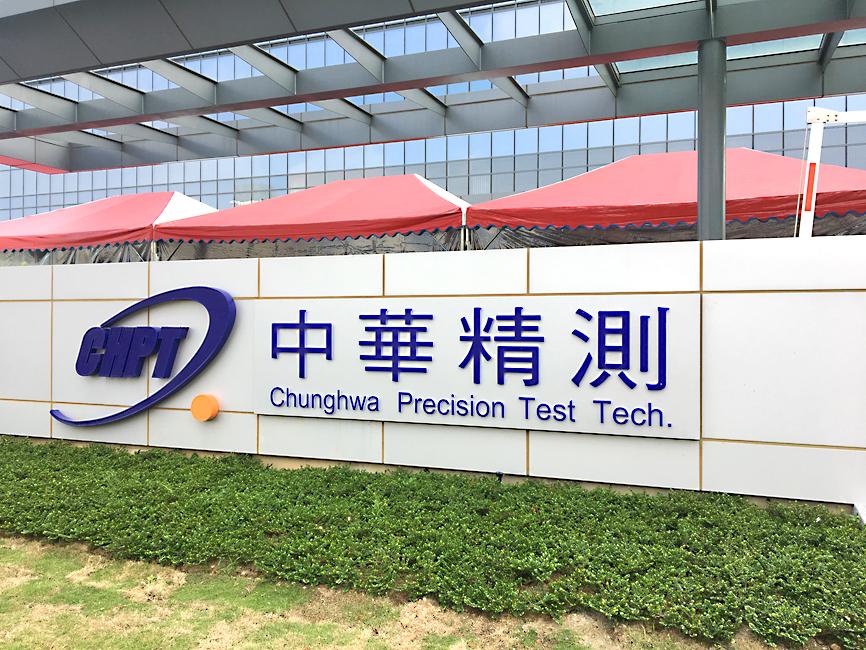Chunghwa Precision Test Technology Co (CHPT, 中華精測), which provides wafer and chip testing services, yesterday reported that net profit last quarter jumped 90 percent from a year earlier due to growing demand for application processors used in 5G applications.
5G technology would be a major growth driver for the company’s business and the global semiconductor industry in the next few years, CHPT said.
The company in February told investors that it had not seen customers delaying 5G deployment due to the COVID-19 outbreak.

Photo: CNA
First-quarter net profit soared to NT$179 million (US$5.95 million) from NT$94 million in the same period last year, a company statement said.
That was also up 7.8 percent from NT$166 million in the final quarter of last year.
Earnings per share jumped to NT$5.46 from NT$2.87 a year earlier and NT$5.06 in the previous quarter.
Gross margin improved to 52.6 percent last quarter from 50.6 percent a year earlier, but was down from 53.7 percent in the previous quarter.
Revenue surged 48.51 percent year-on-year to NT$900 million from NT$606 million.
By segment, application processors remained its biggest revenue source, contributing 57.3 percent to last quarter, up from 53.2 percent a year earlier.
The company made progress in expanding its new vertical probe card (VPC) service last quarter, with a revenue share of 26 percent, up from 4 percent a year earlier.
CHPT expects VPC to be a major growth driver this year after landing orders last year from a first-tier client to test application processors for mobile phones.
The COVID-19 pandemic has not affected the company’s operations and financial performance, it said, adding that all of its employees at home and overseas are healthy.
No infections have been reported, it said.
CHPT said it is building up inventories of key components and materials to avoid potential supply disruptions arising from broader containment measures and transportation restrictions.
The company is to give its business outlook at an investors’ conference today.

SEMICONDUCTORS: The German laser and plasma generator company will expand its local services as its specialized offerings support Taiwan’s semiconductor industries Trumpf SE + Co KG, a global leader in supplying laser technology and plasma generators used in chip production, is expanding its investments in Taiwan in an effort to deeply integrate into the global semiconductor supply chain in the pursuit of growth. The company, headquartered in Ditzingen, Germany, has invested significantly in a newly inaugurated regional technical center for plasma generators in Taoyuan, its latest expansion in Taiwan after being engaged in various industries for more than 25 years. The center, the first of its kind Trumpf built outside Germany, aims to serve customers from Taiwan, Japan, Southeast Asia and South Korea,

Gasoline and diesel prices at domestic fuel stations are to fall NT$0.2 per liter this week, down for a second consecutive week, CPC Corp, Taiwan (台灣中油) and Formosa Petrochemical Corp (台塑石化) announced yesterday. Effective today, gasoline prices at CPC and Formosa stations are to drop to NT$26.4, NT$27.9 and NT$29.9 per liter for 92, 95 and 98-octane unleaded gasoline respectively, the companies said in separate statements. The price of premium diesel is to fall to NT$24.8 per liter at CPC stations and NT$24.6 at Formosa pumps, they said. The price adjustments came even as international crude oil prices rose last week, as traders

SIZE MATTERS: TSMC started phasing out 8-inch wafer production last year, while Samsung is more aggressively retiring 8-inch capacity, TrendForce said Chipmakers are expected to raise prices of 8-inch wafers by up to 20 percent this year on concern over supply constraints as major contract chipmakers Taiwan Semiconductor Manufacturing Co (TSMC, 台積電) and Samsung Electronics Co gradually retire less advanced wafer capacity, TrendForce Corp (集邦科技) said yesterday. It is the first significant across-the-board price hike since a global semiconductor correction in 2023, the Taipei-based market researcher said in a report. Global 8-inch wafer capacity slid 0.3 percent year-on-year last year, although 8-inch wafer prices still hovered at relatively stable levels throughout the year, TrendForce said. The downward trend is expected to continue this year,

Taiwan Semiconductor Manufacturing Co (TSMC, 台積電), which supplies advanced chips to Nvidia Corp and Apple Inc, yesterday reported NT$1.046 trillion (US$33.1 billion) in revenue for last quarter, driven by constantly strong demand for artificial intelligence (AI) chips, falling in the upper end of its forecast. Based on TSMC’s financial guidance, revenue would expand about 22 percent sequentially to the range from US$32.2 billion to US$33.4 billion during the final quarter of 2024, it told investors in October last year. Last year in total, revenue jumped 31.61 percent to NT$3.81 trillion, compared with NT$2.89 trillion generated in the year before, according to